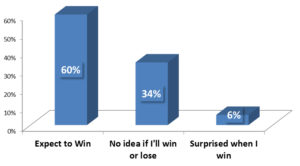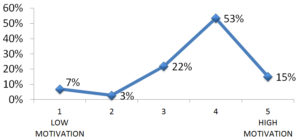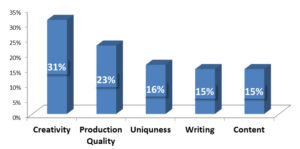
By Andrew Felix, WEAU-TV, Eau Claire
One positive thing you can say about the broadcast industry is there is no shortage of awards programs or awards you and your station can win. Our industry really shines when it comes to ways to honor the hard work of individuals and stations. The key is to understand the benefits of awards, and how we as managers can use them to motivate our employees. Several years ago, I received my first WBA Award nomination and I remember the goosebumps of pride and accomplishment. This was the first time I had attended anything like the WBA Gala and had seen my work up against my peers of all levels of experience. Although, I took 3rd place that first year, it motivated me to push my boundaries and grow as a producer of content. Now, years after I have won several awards from both the WBA and through other awards programs, I can honestly say I am still excited to submit my work each year in hopes of getting a nomination and maybe even a win. However, this article is not really about me; it is about how you and your station can use award programs to motivate your employees all year long.
About 4-years ago my station received lots of WBA nominations throughout many of the categories. This was the first year we really felt like we had a chance at News Operation of the Year and Station of the Year. So, we sent many employees to enjoy the Awards Gala, and, hopefully, celebrate our win. Although, we did win several categories, we did not get enough points to win the big prizes. As the person who oversees the awards for our stations, I immediately became worried. It’s because I knew I had been overly-optimistic about our chances at winning News Operation and Station of the Year, and I felt like I had raised everyone’s expectations. I was worried, because, as a manager, the last thing I wanted was for this big, team-building experience to turn into a morale-buster. However, what happened next was even more special and made the trip completely worthwhile. Following the WBA Awards Gala, we all gathered in the lobby of the Madison Marriott to take a photo and have a drink. Our employees did not complain or say anything negative. Instead, I heard things like “How can we beat them next year?”, “I need to up my game?”, “We can win this, we need to work at it.” The next day, while in the car, I heard reporters talking about doing better stand-ups and researching good features. I heard photographers and creative services people talk about using GoPros and being more creative. This is when I realized that you don’t just submit entries for awards at the end of the year; you plan for awards and use them to motivate your staff throughout the year.
Following the 2016 WBA Gala, the Awards Committee sent out a survey and asked several key questions about how your station and staff approach awards.
How do you feel about your awards submissions?

In the WBA program, only three entrants receive a nomination per category and division. For example, if a category receives 10 submissions, only 30% will receive the nomination and 10% will win first place. The goal of this question was to determine how many people are proud and confident in their entries. We saw a very high 60% of people say that they “expect to win” with their submissions. This shows that people are confident in their work and they want to win.
How much do awards motivate the work done by you and your station?

This question gives us great insight and shows us that 68% of the Wisconsin broadcast community is highly motivated by the awards program. However, it also shows room for stations to grow and utilize the awards program to motivate their employees and work.
Which criteria do you feel is the most important when judging awards?

There are many important criteria levels when entering awards. Creativity (doing something original/different) and high levels of production quality are what entrants feel stand out and are important when judging. Just because you have severe weather or breaking news does not mean your coverage is award-worthy. Often times, submissions get entered based on the intensity of the story and not the quality of work. As someone who has judged several award competitions, I can tell you that things like creativity, production quality and writing are key to getting my vote.
Entering and winning awards have obvious promotional benefits for our stations. However, awards can also be used as a way to motivate staff and increase the overall quality performed by individuals and the station as a whole. The bottom line is that competition is good because it gives us all a reason to try new things and put forth a little more effort.
Here are a few ways you can adjust your awards procedures to increase the quality performed by your station:
First, the awards program must be inclusive of ALL employees, and the facilitator should not be someone who enters. Often times, senior staff members take over the awards. This can crush the motivation of your younger staff. Share the categories and rules with all of your staff, and allow them to submit ideas to the facilitator or to a small committee. That person or group would then decide the best work to enter for the station. This should motivate your newest staff members and allow them to feel included while keeping your senior staff current and on their toes.
Second, take a forward approach to awards and plan for them throughout the year. Do not tailor stories or segments to the award category, but rather, identify opportunities when your station should put forth a little extra effort. For example, let’s say you discover a really good feature story. Rather than having one reporter interview, write, shoot and edit this story in one day, you pool some resources and plan the shoot in advance with a photographer, get your graphic designer and best editors involved and you turn a good story into an award-winning story.
Third, judge awards from other states/competitions. Entrants can really learn and grow from experiencing awards from the perspective of a judge. This also allows entrants to mentally visualize how they would judge their work against others. It should give them a better understanding of how to improve and win. (HINT: The WBA is always looking for people to judge other state competitions!)
Fourth, recognize anyone and everyone who had anything to do with a nomination or win. Often times, the reporters, anchors and hosts get all of the attention. However, the hard-working photographers, editors, audio engineers, producers, directors and even board operators have a role in the win. Recognizing the “face” of an entry will give them pride, but you risk creating animosity with everyone else. One of the big reasons to enter awards is for employee motivation, and the last thing you want to do is motivate one employee and put down six others. Sending out an e-mail with all of the names or pulling people aside and congratulating them can go a long way to create a positive team environment.
The information in the survey and the growing number of yearly award submissions and Gala attendees is a good sign that people take the awards program seriously. As managers, if we put an emphasis on using awards as a yearlong motivator, I think we will see our stations rise to new levels of quality but more importantly, we see a significant increase in the collaboration, dedication and positive drive from our employees.



